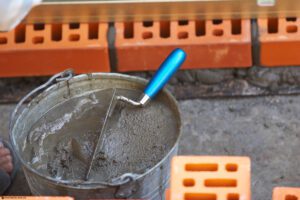
The volume of domestic cement consumption in Ukraine by late 2021 may reach 10 million tonnes for the first time since 2014, Head of the Ukrcement association Pavlo Kachur has said.
“We have production data for nine months, and we can predict with slight optimism that this year, for the first time since 2014, we will move to more than 10 million tonnes of cement consumed in the domestic market. If there are no emergencies, we will reach 10.5 million tonnes,” Kachur said in an interview with Interfax-Ukraine.
According to Ukrcement, in January-September 2021, cement production increased by 15.2% compared to the same period last year. At the same time, over the past four years, the volume of the cement market amounted to 9 million tonnes per year.
“Our market capacity is small. For the last four years, it is up to 9 million tonnes per year. In Poland, comparable in terms of population, which is much smaller geographically, the volume of consumption in 2020 amounted to 18.9 million tonnes – twice as much. Therefore, we have room to grow. Our factories operate at two-thirds of their actual capacity,” Kachur said.
According to him, the increase in cement consumption is associated with a positive period in the construction market, including active road construction.
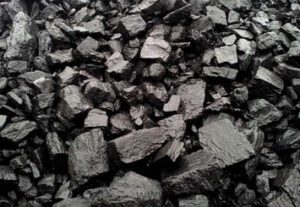
The majority of cement producers in Ukraine are forced to work with minimum margins due to the rise in coal prices by more than two times, the Ukrcement association has reported.
“The price swing for coal this year did not pass us by. The supply contracts were signed last year at an average price of $60 per tonne, and in August, suppliers agreed to ship coal at a price of at least $175 per tonne. This creates significant pressure on the pricing policy. It is impossible to make cheap goods out of expensive components,” Chairman of the Ukrcement association Pavlo Kachur said in an interview with Interfax-Ukraine.
According to him, the cost of energy is 52-55% of the cost of clinker required for cement production. At the same time, all Ukrainian cement plants have previously been modernized and switched to coal due to the high price of gas.
The situation with the rise in prices for cement in Ukraine due to the rise in prices for coal is not unique and is observed in the markets of other countries, Kachur said.
“For example, Turkish cement producers sharply raised cement prices in July due to the rise in the cost of coal. We proceeded from the fact that we must take into account the needs of consumers. Therefore, some companies significantly minimized margins in order to go through this difficult period with minimal costs for cement plants and the construction market as a whole,” he said.
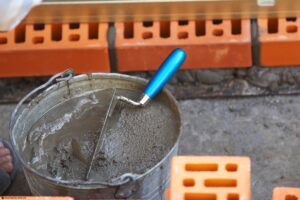
The introduction of antidumping duties on imports of Turkish-made cement may lead to an increase in prices for Ukrainian products by 50%, as well as lead to an increase in prices for repairs, housing, construction of infrastructure facilities, former state commissioner of the Antimonopoly Committee of Ukraine (AMCU) and founder of the League of Antitrust Ahia Zahrebelska said.
“Two years ago, the Ministry of Economy has already introduced duties on Russian, Belarusian and Moldovan cement, as a result of which the price for Ukrainian cement has grown to 40%. After the introduction of duties on Turkish cement with a simultaneous rise in the price for energy resources, the price may rise by another 50%, “she wrote on Facebook.
So, with an increase in cement prices, the budgetary costs for construction of roads, infrastructure projects under Big Construction will increase, the cost of real estate, the prime cost of which includes the cost of cement, as well as individual repair work using cement will increase, the expert said.
According to Zahrebelska, the share of imports in the Ukrainian cement market is only about 10%, but this creates competitive pressure on Ukrainian producers and restrains the growth of their prices. At the same time, the next introduction of import duties will allow large national producers to increase prices for their products.
The expert notes that the AMCU previously sent recommendations to PrJSC Kryvy Rih Cement, PrJSC Mykolaivcement, PJSC Podilsky Cement, and PrJSC Ivano-Frankivsk Cement, which occupy 90% of the market, not to raise prices in anticipation of antidumping measures. At the same time, Zahrebelska points to a significant increase in prices and profits of enterprises after the introduction of duties on imports of cement from Russia, Belarus and Moldova.
According to her, the League of Antitrust (NGO Union for the Protection of Competition and Consumers) has prepared an appeal to the AMCU regarding monopoly high prices for cement.
“The League of Antitrust is convinced that the Antimonopoly Committee can stop the manipulations if it starts investigating violations in the actions of the cement association members and stops the unreasonable rise in prices observed in recent years,” the organization said in the appeal.

Ukrcement proposes to exclude from the agreement on a free trade zone (FTA) with Turkey commodity items that are fully provided by its own manufacturer, head of the Ukrcement association Pavlo Kachur told the Interfax-Ukraine agency.
“The signing of an agreement on a free trade zone with Turkey for the cement industry poses a serious threat. We have transferred our position to the Ministry of Economy and the trade representative of Ukraine,” Kachur said.
The expert emphasized the need for a particularly balanced government policy in the context of the global economic crisis, so that under the slogans of free movement of goods not to lose their own manufacturer and not to leave tens of thousands of Ukrainians without work.
“The established production capacity for the production of cement in Turkey is 140 million tonnes of cement per year. In Ukraine, this figure is more than 10 times less. Turkey’s own cement consumption is about 60 million tonnes. This means that an importer with such capacities that Turkey has, playing with price policy, can easily destroy the production of cement in Ukraine,” said Kachur.
He emphasized the effectiveness and efficiency of the Big Construction program in the fight against the crisis.
“This program has become a lifeline for the entire construction industry during the global economic crisis. In the event of the signing of an FTA agreement with Turkey, the funds allocated from the budget of Ukraine, the funds of Ukrainian taxpayers, will support the producers of the neighboring state, instead of supporting their own,” he said.
He stated that the cement industry in Ukraine is able to fully provide consumers with high-quality cement that is competitive in the European market.
“The cement industry is developing and modernizing. Billions of dollars are invested to maintain high quality products, reduce emissions, reduce CO2 emissions. In March 2021, the cement plant in Balakliya resumed clinker firing, the kilns of which were shut down by the former Russian owners for ten long years. This will further strengthen the ability of the cement industry of Ukraine to provide its own market with cement,” Kachur summed up.
The head of the Ukrcement association expressed hope that the manufacturers’ arguments will be heard.
In September 2020, the Interdepartmental Commission on International Trade launched an investigation into the import of Portland cement and clinker cement from Turkey to Ukraine.
The import of these items in 2019 increased nine times, and according to the results of January-August 2020 – 13 times compared to the same period of the previous year.
According to the State Statistics Service of Ukraine, in 2020 the volume of exports to Turkey decreased slightly – to $2.436 billion (by 7% compared to 2019), imports increased slightly – 2.415 (by 2.5%).
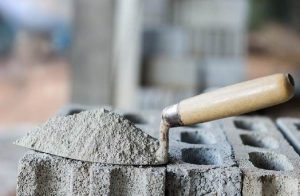
The Big Construction program and plans to increase the share of cement concrete roads in Ukraine give reason to hope for the growth of the cement industry, Director of the Ukrcement cement producers association Roman Skilsky has said.
“The main reason for optimism is the Big Construction program… This will mean a noticeable increase in demand for cement, which will allow domestic companies to increase the number of idle reserve capacities,” he said in an interview with Interfax-Ukraine.
Skilsky said that early August, the Shulgin State Road Research Institute, together with Ukrainian Automobile Roads Agency of Ukraine (Ukravtodor), presented a concept and program for the construction of cement concrete roads in Ukraine, which envisage an increase in the number of such roads from 1% to 5% in the next five years. According to him, the process of approval of these documents by the relevant central executive authorities is underway.
At the same time, he said that in the Czech Republic the share of such roads is 22%, and in Germany – 42%.
The head of Ukrcement also counts on the positive impact of the law on the supply of construction products in the market on the industry. The document was adopted by the Verkhovna Rada on September 2 within the framework of European integration, which implements the provisions of Regulation (EU) No 305/2011 of the Council of Europe regarding construction products. Skilsky said that the industry harmonized national and European standards three years ago, but was forced to wait for this law. The document also introduces new rules in the field of public market supervision, which will significantly complicate the falsification of cement products.
In addition, the head of the association pins hopes on the investigation of the import of Portland cement and clinker cement from Turkey to Ukraine, launched early September by the Interdepartmental Commission on International Trade. According to him, this import increased 9-fold in 2019 and 13-fold in January-August 2020 versus January-August 2019, and by the end of the year it may exceed 1 million tonnes.
The head of Ukrcement explained such an increase in imports by a sharp reduction in Turkey’s domestic market, a strong weakening of the lira against the backdrop of a strong hryvnia and simple maritime logistics, and added that the Turkish cement industry is ten times larger than the Ukrainian one.
“The market in Ukraine is not growing, it has been fluctuating between 9.2-9.5 million tonnes for the third year in a row, so this deformation means worsening conditions for Ukrainian producers, and these are four large industrial groups, two of which are international,” Skilsky said.
He said that Ukrainian producers will be able to easily replace this volume of imports, and the replacement of Portland cement and clinker imported from Russia, Belarus and Moldova after the introduction of anti-dumping duties on the import of Portland cement and clinker from these countries last year is evidence of this.
“The cement industry can increase production further, the capacity reserve is sufficient for at least 20% growth. The question is whether there is a market for such growth,” the head of Ukrcement said.
He said that at the beginning of 2020 there was hope for a 20% growth that the construction market showed in 2019. However, the pandemic has made negative adjustments, and in the first seven months of this year, the decline in construction was already 4.6%, including in the housing construction sector – by 22%, and there is only a slight increase in infrastructure construction, Skilsky said.
According to the State Statistics Service, the production of Portland cement in January-July 2020 in Ukraine increased 3.7%, to 5.04 million tonnes, and clinker grew by 1.5%, to 3.9 million tonnes, including in July 2020 compared with July 2019, the growth was 5.9% and 12.2%, respectively.
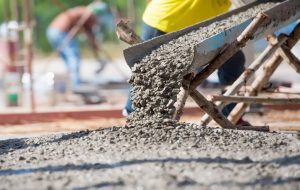
The Interdepartmental Commission on International Trade has launched an antidumping investigation into the import of cement from Turkey to Ukraine.
The commission’s decision of September 2, 2020 to initiate an investigation comes into force from the moment of its publication, according to data on the Uriadovy Kurier edition’s website on September 5, 2020.
According to the report, the commission received a corresponding complaint from PrJSC Dyckerhoff Cement Ukraine, PrJSC Kryvy Rih Cement, PrJSC Mykolaivcement, PJSC Podilsky Cement, Cement LLC with the support of PrJSC Ivano-Frankivskcement.
According to the applicant, during the observation period (2017-2019), the dumping import of cement in absolute terms increased by 809%, in terms of consumption by 837%. In addition, the trend continues in 2020. According to the forecast, by the end of 2020 imports will increase by 1,815% and 2,547%, respectively. At the same time, prices for imported cement were lower than the prices of the applicant, and the growing volumes of imports forced him to reduce prices, despite the increase in cost.
Having considered the complaint, the authority concluded that import of cement from Turkey to Ukraine was carried out in volumes and on conditions that could cause damage to the national producer.
The Ministry of Economy has been instructed to conduct the antidumping investigation. Registration of interested parties is carried out within 30 days.